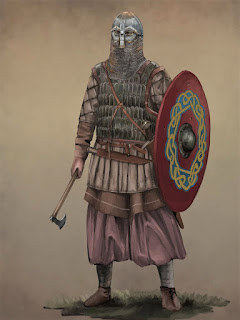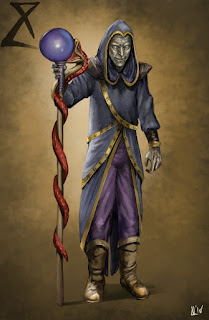Making Characters Weird: Fighters
 |
| Mercenary Dane by JlazerusEB is licensed by CC BY-NC-ND 3.0 |
|
Roll |
Weird Trait |
|
1 |
TROPHY. You always keep the teeth of your fallen foes as a trophy, stopping after each battle to remove them. You claim the teeth talk to you and give you battle strategies. |
|
2 |
OATH. Your oath to your warrior guild means you can’t remove your helmet in the presence of non-members. If forced to do so, you suffer -1 to saving throws until you atone. Wearing the helmet gives you a +1 bonus to NPC Reaction Rolls among cultures that recognize its significance. |
|
3 |
NAMED WEAPONS. You name all your weapons, either with names of people from your past, or with titles (e.g., Clandestine Agony). There is one of your named weapons you won’t use. It is needy and keeps asking why you won’t use it. |
|
4 |
SUPERSTITIOUS. You carry many more weapons than you need, but you only use one of them. You claim the others are bad luck and it’s your duty to keep them away from other people. |
|
5 |
EYE CEREMONY. When you kill an opponent, you hold their eyes open. When doing so, you see details of the person’s life. Roll 1d20; on a 1, the following happens (described by the referee, roll 1d6): 1) The victim felt extreme remorse. 2) You realize your victim was actually a truly good person. 3) Your victim is not who you thought they were. 4) Your victim cursed you while dying. 5) Your victim held knowledge that no one else has. 6) Your personality and objectives change to those of your victim. |
|
6 |
BATTLE MANUAL. You are in possession of an ancient manual of fighting techniques, passed down through the centuries. If someone were to take it, they could learn your secrets and you would lose your effectiveness in battle. |
|
7 |
FOE EATER. You eat the bodies of the foes you slay so they can’t return as undead. You keep your teeth and fingernails filed extremely sharp & usually have blood and gore around your mouth. -1 CHA. Each time you eat a body, add +1 to CON for 24 hours, including any temporary bonus HP. It takes 1d4 + 4 turns to consume the body after a battle. If you are forced to leave before eating the body, you take a -2 penalty to WIS for the remainder of the day. [Credit for this idea goes to Arkhein of the Rather Gamey blog, which unfortunately hasn’t been active since March 2019]. |
|
8 |
BATTLE RAGE. You can enter an intense battle rage, brought on by one of the following conditions (roll 1d10): 1) Hallucinogenic mushrooms; 2) Enchanted bear skin cloak; 3) Alcohol; 4) Drawing power from the Void; 5) An oath to Chaos; 6) A ritualistic trance (including chanting, singing, dancing, or a “cleansing sweat”); 7) Unnatural hatred of… (pick something: wizards, elves, neighboring cultures, etc.); 8) A sacred ceremony performed by a priest or shaman of your culture; 9) Ritualistic body paint; 10) The new and full moons. During your battle rage, foes must succeed on a morale check to attack you. |
|
9 |
GIANT SLAYER. You come from a culture dedicated to fighting giants. You carry giant-sized weapons that are too big for you. You always go last in the round and take a -1 penalty to attack rolls but do +2 damage. |
|
10 |
SPIDER KIN. Due to constant exposure, you have worked up a resistance to spider poison. You save vs poison at +4 but take a -2 penalty to CHA due to your jumpy personality and hairy appendages. Anyone touching you must save vs poison with a +2 bonus or take 1d6 damage. You might have extra eyes. |
|
11 |
GUTTER BORN. Due to constant exposure, you have worked up a resistance to diseases carried by vermin. You add a +4 bonus to any saving throws made vs disease effects. Your body is covered by pock marks and scars from previous diseases, giving you a -1 penalty to CHA. |
|
12 |
RAVENS. You are constantly followed by an unkindness of ravens (4d4). You claim you can understand them (referee determines effect). They feed on foes you have slain, which heals your HP as if you had rested. You do not recover HP from normal resting or sleeping, and your sleep is always accompanied by nightmares. |
|
13 |
SCARIFICATION. Your culture carves notches on the skin to mark kills. When you have no places left to mark, you are expected to retire from adventuring life. Your notches provide a +2 Reaction Roll bonus among people from your culture, but a -2 Reaction Roll penalty among everyone else. |
|
14 |
PROPHECIES. Your armor and weapons are carved with the religious prophecies of a long-forgotten faith. You refuse to use any other armor or weapon (even magical). Once per level, you can use the weapon to cut yourself or somehow draw blood for 1d6 Damage and ask the weapon a yes-or-no question. The answer is always up to interpretation by the referee. |
|
15 |
WORDLY. You traveled to every continent while a youth and learned a variety of fighting styles. You wear an odd combination of clothing, hair styles, jewelry, and other decorations from each culture. |
|
16 |
REINCARNATED. You are (or believe yourself to be) the reincarnation of a famous (or infamous, or forgotten, or mythical) warrior from the past (or the future). |
|
17 |
SPACE BORN. You are convinced that you come from another planet. You have writings or other items you claim prove it. |
|
18 |
MEDITANT. You spend the first round of every combat in meditation and reflection over the blood you are about to spill. |
|
19 |
ANIMAL FRIGHT. Normal animals hate you for some reason. They screech, bark, howl, etc. when you approach, making stealth impossible. During any encounters with normal animals, their morale is lowered by -2. |
|
20 |
MASK. You always wear a mask painted with the image of the face of the last important person you defeated as a way of respecting and honoring your foes. |



Good stuff!
ReplyDeleteOne thing I like about spells for magic users is keeping them as a form of treasure... bits of lore to be quested after and learned.
It wouldn't fit every setting but a similar notion is in wuxia movies where there are coveted fighting styles, some that can only be learned from odd beings in odd places. More questing.
Probably drifting too close to 'powers' though...
Thanks for reading & commenting!
DeleteI actually am treating spells like that in my B/X-Old School Essentials game I'm running for my daughter & her friends right now. Three of the players are elves, so I started them each with a spell that I randomly rolled from the table. After that, they are going to have to find the spells they need, either by finding someone to teach them (which is a double-edged sword, because why would that person want to give up their knowledge?), or finding ancient books, and then figuring out how to read them (only one of the elves has read magic, so they other two couldn't even read them if they came across them). It'll be interesting, but it was one of the things I set up in my world background document: magic is ancient, pre-dating all modern cultures, and most of its secrets have been lost, and one of the primary quests of the adventurers will be to try to recover old books of magic, but that can also lead to danger, because if they let it be known that they found a book, it will draw unwanted attention and others will undoubtedly try to steal it.
I had so much fun reading this post! Thoroughly enjoyable. "The teeth talk to you and give you battle strategies." Man, that's gold. Too much good stuff here not to show up in my game. I'll probably reference in a future post. Keep it up.
ReplyDeleteHey, thank you so much! I really appreciate you reading, commenting, and complementing my stuff! I can't wait to read about you using some of these in one of your games. I'm working on some additional lists for other classes as we speak. Cheers!
Delete